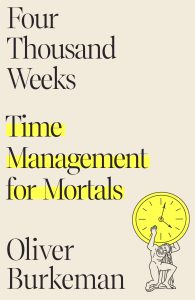
From today’s book: “…you’re guaranteed to miss out on almost every experience the world has to offer….” (p. 50 , Four Thousand Weeks, Picador .)
Synopsis from GoodReads:
“The average human lifespan is absurdly, insultingly brief. Assuming you live to be eighty, you have just over four thousand weeks.
Nobody needs telling there isn’t enough time. We’re obsessed with our lengthening to-do lists, our overfilled inboxes, work-life balance, and the ceaseless battle against distraction; and we’re deluged with advice on becoming more productive and efficient, and “life hacks” to optimize our days. But such techniques often end up making things worse. The sense of anxious hurry grows more intense, and still the most meaningful parts of life seem to lie just beyond the horizon. Still, we rarely make the connection between our daily struggles with time and the ultimate time management problem: the challenge of how best to use our four thousand weeks.
Drawing on the insights of both ancient and contemporary philosophers, psychologists, and spiritual teachers, Oliver Burkeman delivers an entertaining, humorous, practical, and ultimately profound guide to time and time management. Rejecting the futile modern fixation on “getting everything done,” Four Thousand Weeks introduces readers to tools for constructing a meaningful life by embracing finitude, showing how many of the unhelpful ways we’ve come to think about time aren’t inescapable, unchanging truths, but choices we’ve made as individuals and as a society—and that we could do things differently.”
My Comments
The full sentence is “Once you truly understand that you’re guaranteed to miss out on almost every experience the world has to offer, the fact that there are so many you still haven’t experienced stops feeling like a problem.” Burkeman writes quotable essays about the realistic limits of what any human being can accomplish. He deflates our plans to fit everything in, to put off important stuff until “later”, to act on FOMO (fear of missing out). He explains how to achieve the joy of missing out by exercising choice. Did you ever feel relieved that you weren’t invited to some event?
The first section, “Choosing to Choose”, pp 17-109, addresses the pain and paradoxes of having to make choices, and how to rethink this as the opportunity and freedom we can feel good about.
The second section, “Beyond Control”, pp 113-228, describes “the human disease” of believing we can achieve security, control our time, finally get everything done. He detours into illustrative topics like “The Great Pause”(of Covid), appreciating art, alcohol craving, and Heidegger.
Burkeman’s main strategy is confronting and accepting a paradox: a finite thing, a person, is able to have limitless goals and aspirations which can never be satisfied. Is anything ever enough? Can you love what fate, chance, and accident have produced in the Now?
The book prods me to reconsider what I have chosen to do, and how I am using those weeks out of the few thousand I started with.
A Book Is A Telepathy Device
Pick up a book, look at it. Feel the heft. Riffle through the pages. Look at the layout, the ink, the letters, the spaces and paragraphs. It’s a device with instructions from the author: Beam me out, Scotty, from this mind of mine to other minds. Transfer these words and thoughts and give another mind a chance to be enlarged.
There are other ways to accomplish these transfers- conversation, social media, audio books, podcasts, art and music.But I like the way a physical book allows me to stop or pause and start again, or re-read. And to reconsider, make notes or underline or write “No, I don’t agree”. Or to get caught up in the rapid river of a good story. Or skip to the end. Or decide not to finish.
I have a habit of carrying these mind machines around with me to appointments or activities. And check my book shelves- did I forget I had this book? This one has suddenly become relevant. I really liked that Hemingway short story-let me check it out again.
I want to share some of the books I’ve been reading recently. I’ll give a brief introduction, then the publisher’s blurb, and finally a few comments or a summary of my reactions. I generally select books to read for these conscious reasons:
- I expect to enjoy it
- I hope to learn some path that will improve my life
- Improves my effectiveness as a psychiatrist
- It seems important because other people I respect think so.

 Measurement Based Care Using the PHQ-9 Form
Measurement Based Care Using the PHQ-9 Form
Just ordered this for my husband – great recommendation- thanks!🙏